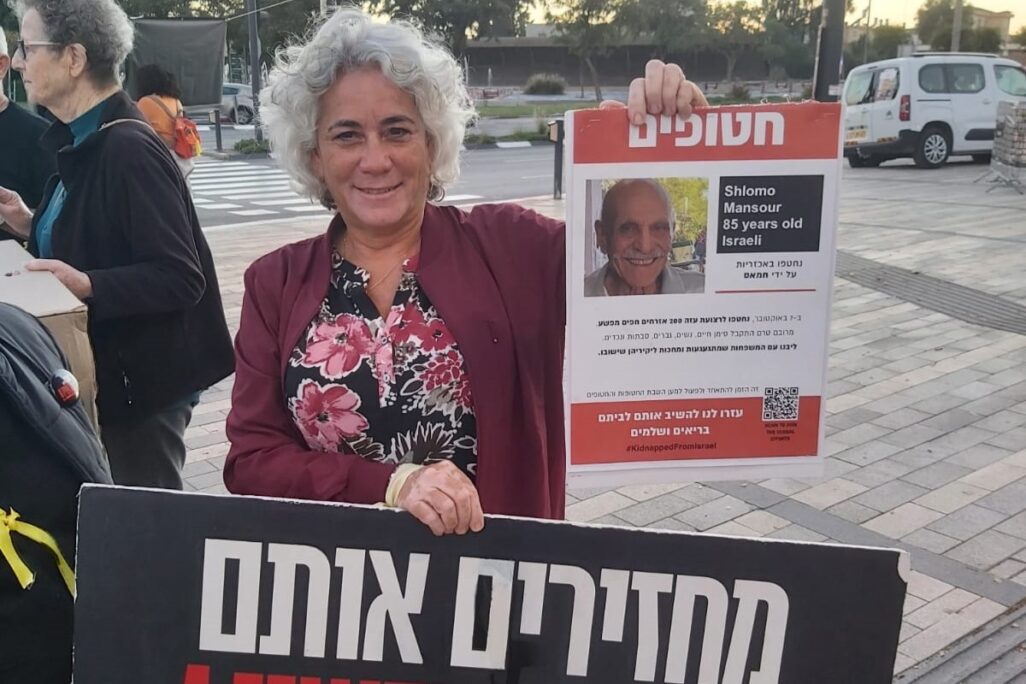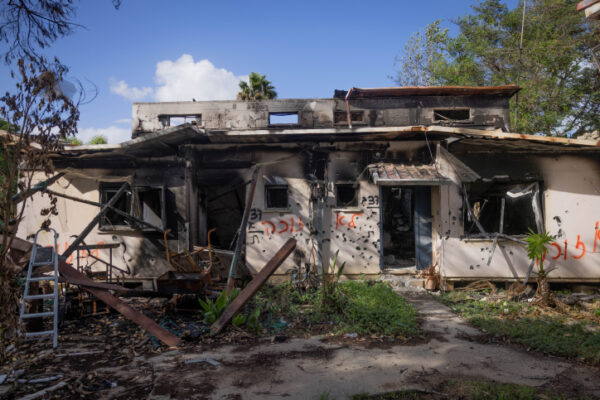
Yeela Raanan, 59, an anthropology professor and mother of three, was at her home on Kibbutz Kissufim with her 12-year-old daughter on the morning of Oct. 7. From the bomb shelter, the two heard Hamas terrorists enter and loot their home. Despite her experiences that day, Raanan, who teaches at Sapir College, near Sderot, remains a staunch peace activist. She spoke with Davar about her experiences on Oct. 7 and her mindset since then.
When terrorists infiltrated Kibbutz Kissufim, Raanan was with her daughter in one of her home’s two bomb shelters. After witnessing a man wielding a rifle speed through the kibbutz, the pair moved to the shelter hidden behind the house.
Terrorists ended up entering their house and stealing many of their possessions, but Raanan and her daughter survived, spending more than 12 hours in a bomb shelter.
Raanan described experiencing a sense of disassociation while the kibbutz was raided.
“While it was happening, I didn’t understand its power,” she said. “The horrors didn’t happen to me, I was disconnected. I never imagined that there could be a pogrom. The experience in the process was unpleasant, but there was no horror. Hamas was at my house. They destroyed things, broke a door with a hammer, took things and spilled the contents of the cabinets. I heard everything from the bomb shelter. But when I left, I didn’t hear the screams. It was quiet.”

While in the bomb shelter, she recounted, her daughter asked, “Will they kill us?”
She told her daughter that yes, they might. “But I wasn't expecting it,” she explained. “Even when I knew they were able to open the door, in my heart I didn’t believe it would happen. My essence is faith in humankind. It is possible that they will come in and kill us, but until they have done so, I expect that they won’t. It gives protection for dealing with evil. I do not look for evil.”
Although Raanan does not seek out evil, neither is she surprised that it exists. “It’s clear to me that cruelty is part of human capabilities,” she said. “People came into our communities and committed murder and rape. This is not the first time this has happened to humanity. It’s sad, but not surprising.”
“I know cruelty exists,” she continued. “I’m not gullible. I'm an anthropologist, I teach how society educates us. We know it’s possible to educate towards things, we’re social animals. What we do changes reality.”
Raanan’s house on Kibbutz Kissufim is only a mile away from the Gazan city of Khan Yunis. While living there, she would see lights from weddings and hear the Muslim call to prayer. Her concern for the Gazans, who she considers her neighbors, is not purely selfless, but also a recognition of the “mutual dependence” between Gazans and Israelis living in border communities. For example, lack of proper sanitation on Gazan beaches might lead to an outbreak of sickness for Israelis visiting the beach up the coast, she explained.
She took a nuanced view on Israel’s post-Oct. 7 military campaign. “The goal is a life without fear, in security,” she said. “The question is how to achieve security. It is clear to me that harming a person will not create in them a desire not to harm me. I expect they will also have a desire for revenge.”
“As a person, it is very important to me to act in a way that I perceive as moral,” she continued. “Once I die, I want to know that I acted as much as I could in a way that I will not regret. If the only available way to my security is to kill someone standing in front of me, I can accept that.”
After being evacuated to the Dead Sea, Raanan eventually returned to the Gaza envelope to resume her work as head of the Regional Council for the Unrecognized Arab Villages in the Negev (RCUV).“I’m needed here,” she said. “This is my second community.”
RCUV represents the interests of Israel’s Bedouins, a population of 200,000 or so historically nomadic Arabs. Many Bedouins live in unrecognized villages in southern Israel that lack access to basic infrastructure.
Raanan has been an activist for Bedouin rights for more than 20 years. “I came to Arad when I was in first grade, and I’ve been in the Negev ever since,” she said. “The Bedouin are my neighbors, part of my childhood landscape, like the desert and the bare mountains. When I finished my doctorate I wanted to work on civil rights and civil equality. So, in 2001, I was surprised at how much I didn't know about the policy towards the Bedouins. I was drawn to it when I realized the depth of suffering resulting from the policy of non-recognition, poverty, house demolitions.”
Standing up for Bedouins was a way for Raanan to stand up for her own home, she explained. “My city does not end in Arad or Kissufim,” she said. “For me it is the Negev region—Ofakim, the kibbutzim, the moshavim, the Bedouin settlements.”
For Raanan to have personal relationships with many Bedouins is fairly unique for her as a Jewish Israeli. “We live in a space where there is media that separates Jews and Arabs. We need to overcome this,” she said.
Many Israelis who do interact with Bedouins do so only when they interact with Bedouin workers, like Raanan’s husband who has Bedouin workers on his dairy farm. “There is a difference between this and seeing the Bedouins as partners in our mental space, our home,” Raanan said.
She sees her shared work with Bedouins as a gift that not all Israelis are lucky enough to have access to. “What a rich world of people is part of my life. In segregated Israel—at school, at work—you have to do something persistent to make it different, to have a meeting in reality.”
Raanan noted that the Bedouin community has served in the Israeli military, particularly in the search and rescue unit, and acted heroically on Oct. 7.
“As far as I’m concerned,” Raanan said, “on the seventh of October at 12:00, we lost. Accept it, stop and think about what's right for us as a country, what's right for the communities on the border. We didn’t stop to think about the strategy, we took weapons and went to war. They didn’t think about the hostages either, how to bring them home. That’s the important thing right now.”
She rejects the government’s stated aim of destroying Hamas and is not opposed to negotiating with Hamas if doing so could bring an end to the violence.
“Our goal is to have an organization in Gaza that does not use terrorism,” she said. “Be smart. Wisdom comes from thinking together with people from different lines of thought. We need to think together with the Americans, the Palestinian Authority, Saudi Arabia, how to reach our goal.”
She described her strategy as “human dignity for all.” “I’m talking to you, not because you’re the same as me, but to affirm that your needs as a person are important,” she said, describing her approach. “The right to respect, that people don’t step on you, that’s important. In Kissufim, in the Western Negev, in Israel, or in Gaza, this is the same strategy. What other strategy could there be?”






